Drag Queen: Identity and Value to Personal and Social Development
Keywords:
drag queen, identity, phenomenologyAbstract
Drag queen is a culture influenced by other countries which is one of the self-expressions through persons’ personalities. The researcher focused on investigating definitions of Drag queen, the meaning of Drag queen towards people who dress in Drag queen, the process of value constitution, and the using of Drag queen to improve oneself. This study applied transcendental phenomenology to acquire knowledge by studying the experiences of the informants. The results revealed that Drag queen is a form of expression that allows actors to freely create roles and personalities which depends on the parts that are missing from the minds of the research participants, such as the reflection of one's self, standing up for themselves, sending some message to society, etc. Mentally influenced the informants and fulfilled the missing part. Drag queen also released the informants from bondages though the personality in which they developed to be an identity which came from experiences, interests, and inspirations that want to express to society with no gender limit.
Downloads
References
Bernadette, D. (2018). The Evolution of The Art of Drag In 33 Stunning, Historical Images. https://allthatsinteresting.com/history-of-drag-queens#33
Bunmi, T. (2009). Lōk modern & post modern [Modern & Post modern World] (5th Ed.). Saithan.
Chanthawan, B. (2019). Drag Queen khư̄ ʻarai chai nāng chō rư̄ mai ? čho̜ khwāmkhit kap BANDIT phū khǣngkhan Drag Race TH [What is Drag Queen, is it a showgirl or not? Break Your Mind With BANDIT, Drag Race TH Competitor]. Mango Zero.
Chetpayark, K. (2018). Sangkhom Thai yō̜m rap LGBT bǣp mī ngư̄ankhai kamphǣng pitkan khwāmlāklāi thāng phēt nai mummō̜ng khō̜ng khrū kate [Thai society accepts LGBT with conditions The barrier blocks gender diversity from teacher Kate's point of view]. https://thematter.co/social/lgbt-inequality-with-krukath/48901
Chinangi, P. (1997). ʻEkkasān prakō̜p kānsō̜n wichākān wikhro̜ phrưttikam læ kān prap phrưttikam [Documentation for teaching behavior analysis and behavior modification]. Behavioral Science Research Institute, Srinakharinwirot University.
Fuangfusakun, A. (2003). ʻAttalak = Identity: kān thopthūan thritsadī læ krō̜p nǣokhit [Identity: a review of the theory and conceptual framework]. National Research Council Committee Sociology Board of Directors National Research.
Ganjanapan, A. (2019). Khit yāng Michelle fūkō khit yāng wiphāk : čhāk wāt kam khō̜ng ʻatta bukkhon thưng čhut plīan khō̜ng ʻattā [Think like Michel Foucault, think critically: From the discourse of the self to the turning point of the ego]. Siam.
Kaeokangwan, S. (2018). Thritsadī čhittawitthayā bukkhalikkaphāp (rū rao rū khao) [Personality psychology theory (Know us, know them)]. Mocgaoban.
Khunnawisetphong, A. (2018). Nā tā līa phlīa khǣm Thailand Drag Superstar [Natalia Pleacam Thailand drag superstar]. SUDSAPDA.
Levitt, H. M., Surace, F. I., Wheeler, E. E., Maki, E., Alcántara, D., Cadet, M., Cullipher, S., Desai, S., Sada, G. G., Hite, J., Kosterina, E., Krill, S., Lui, C., Manove, E., Martin, R. J., & Ngai, C. (2018). Drag gender: Experiences of gender for gay and queer men who perform drag. Sex Roles, 78(5-6), 367-384.
Moustakas, C. E. (1994). Phenomenological research methods. Sage.
Naruphatthra, R. (1994). Kānphatthanā bukkhalikkaphāp [Personality development] Phuket: Department of Psychology and Guidance Phuket Teachers College.
Silverman, R. (1996). Chittawitthayā thūapai [General psychology] (6th Ed.). Department of Psychology, Kasetsart University.
Prichapanyakun, W. (2020). Language and identity of third sex masters of ceremony as represented in television programs. Journal of Management Science Chiangrai Rajabhat University, 15(2), 143-163.
Sinsomboonthong, T. (2014). Kānmư̄ang rư̄ang khon ( thī thūk thamhai ) mai thammadā : mō̜ng khwāmpen ying khō̜ng nāngsāo ying lak chin wat phān krō̜p khēwī [Politics of (Ab)normality: Looking Yingluck Shinawatra through a queer lens]. Journal of Social Sciences, 44(2), 71-90.
Sinsomboonthong, T. (2017). ʻAttalak rūam klum khō̜ng samāchik phētnō̜ngngō̜ nai thāna yān witthayā khēwī [Collective Identity of “Page-Nongng” as Queer Epistemology]. Journal of Sociology and Anthropology, 36(2), 65-88.
Siriwanbut, P. (2010). Thritsadī čhittawitthayā phatthanākān [Developmental Psychology Theory] (5th Ed.). Chulalongkorn University Press.
Songsamphan, C. (2008). Prawattisāt khō̜ng phēt withī: prawattisāt rư̄ang phēt / rư̄ang phēt nai prawattisāt Thai [History of sexuality : History of sexuality / Sexuality in Thai history]. Women's Health Advocacy Foundation.
Stanley, C. (1981). The Antecedents of Self-esteem. Palo Alto.
Ungphra, N. (2003). Thritsadī bukkhalikkaphāp læ kān prap tūa [Personality Theory and Adaptation]. Thammasat University Press.
Voice TV Editor. (2013). Chalāčhon ' satōnwō̜n ' čhut roēmton kān rīakrō̜ng sitthikē ['Stonewall' riots start gay rights activism]. https://www.voicetv.co.th/read/87862
Downloads
Published
How to Cite
Issue
Section
License
Copyright (c) 2022 Warasan Phuettikammasat

This work is licensed under a Creative Commons Attribution-NonCommercial-NoDerivatives 4.0 International License.
Behavioral Science Research Institute, SWU
114 Sukhumvit 23, Bangkok 10110, Thailand.
Tel.02-649-5000 # 17600



